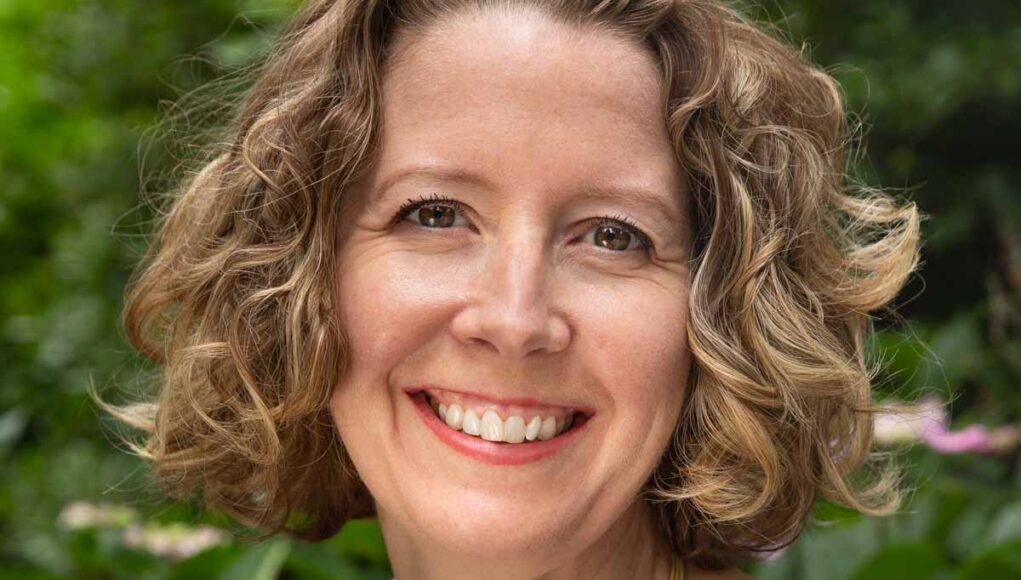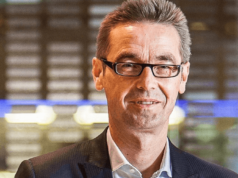“The way organizations and leaders navigate this time will not only matter in the bottom line for their organizations but might well change the course of life on our planet.
We need to marshall together our collective work in order to make changes on a bigger scale – and more intentionally – than we ever have before in the history of the human race.
This is a pretty serious demand on us, and it’s not likely one that we’re up to – at least not today. We hope it’s one we could be up to if we worked hard enough. But how would we work hard enough to meet these demands? And what would we be actually doing in the first place?”
These are the words by Jennifer Garvey Berger in the introduction to her book Changing on the job (now also published in Danish).
In organizations around the world, there is an alarmingly increasing number of leaders and employees who go down with stress or get other work-related illnesses. In life in general and at work, in particular, we are becoming increasingly interconnected.
We experience information overload and we are expected to be able to navigate fast and competently in complex situations. Complexity has come to stay. Life and work are no longer predictable, so how can we learn to embrace and navigate complexity in order to make sense of the world and our role in it?
Jennifer Garvey Berger’s work is based on adult development theory. For many years she has helped leaders around the world see bigger and take more inclusive perspectives while inspiring them to be more creative and collaborative in handling their most complex challenges.
I met up with Jennifer Garvey Berger – Ph.D. from Harvard University and CEO at Cultivating Leadership – after her keynote talk at the Leading Humans conference in Copenhagen in December 2018 and had the pleasure of doing the following interview with her about adult development.
Interview with Jennifer Garvey Berger about Adult Development
Can you please explain what is adult development?
Jennifer Garvey Berger: Adult development is the pattern of our growth over time. Different theorists have a different set of ideas about what exactly it is that’s growing, but basically, the idea is that just as we know kids go through different stages as they mature it turns out that grown-ups go through different stages as they mature.
We talk about different forms of mind. For a long time, we’ve had ideas about something good happens to you as you get older when it comes to elders in society, wisdom, and traditions.
Adult development is the study of what exactly is that good thing happening to us, as we get older
Adult development is the study of what exactly is that good thing happening to us, as we get older. It’s not like you’re learning to tile your bathroom floor. It’s not like you read a book and then you can tile your bathroom floor.
Adult development is a set of ideas that work inside you over time. The first time you come across these ideas they can be a bit disorienting because you didn’t even know you’re on a developmental path. Yet, suddenly you know and all kinds of questions arise for you.
“Harnessing the opportunities in this time of complexity requires a new form of leadership with new approaches to leading people and crafting solutions. If we want organizations where people are thriving and bringing their best, we need leaders who are learning” (J. Garvey Berger at Cultivating Leadership).
_____
READ ALSO: Lynda Gratton: Eyes Wide Open
_____
Do we only develop and grow as we get older or can the rate of growth be really different from one person to the next?
Jennifer Garvey Berger: The news is that we’re always growing and changing. Throughout our entire lifespans, we have the capacity to grow and change. We used to believe that people grew and changed until a particular point. Moreover, we used to believe that when you are hitting maturity then you are done; that you couldn’t grow and change anymore.
Scientists even believed that your brain stopped developing at a certain point and that you wouldn’t grow new brain cells. They don’t believe that anymore. Now they see that we can grow throughout our lifespans.
The questions I think you are asking also are if some people can decide to develop and grow really fast, while other people somehow are growing much slower? That is one of the great mysteries of adult development.
It is quite different from child development. Kids kind of develop in an age-wise way and you can see a 6-year-old have these developmental characteristics plus or minus six months. Adult development is not age-related in that way so you can’t guess what a 26-year-old is going to be like. Actually, the range for 26-year-olds is almost the entire span of what is possible for adulthood.
_____
READ ALSO: Sandja Brügmann: The Future Leader is Ethical, Passionate, Bold & Driven by Purpose
_____
For many years you have been working with organizations and executive leaders teaching them about adult development. Historically, executive leaders have been focusing on the business in terms of increasing productivity and earnings. Do you see an overall pattern in the reasons why leaders contact you in order to get help in coping with complexity?
Jennifer Garvey Berger: I think more and more leaders are finding two things. The first thing is that in an age where computers are able to do so much, and where outsourcing to different countries is able to take so much work away, actually our capacity to think and connect in really sophisticated ways is an incredibly important added advantage that organizations need to hold on to.
The other thing concerns the level of complexity of the world right now, as it requires different ways of being from leaders. We used to think that leaders needed certain skills or certain competencies to be successful. Today, I think people see more clearly that leaders increasingly need capacities like the ability to hold more ambiguity, uncertainty, and further perspectives.
Leaders nowadays need more of these skills just to get through the day! People in organizations are discovering how earlier solutions are starting to look a little bit ridiculous like “I can’t believe we thought we could just do 90 minutes on listening and suddenly the conversations in our organizations would improve!” Really? Did you really believe that? So, leaders are now investing in a different way.
_____
READ ALSO: Otto Scharmer – The World of Today and Tomorrow
_____
To think and connect in really sophisticated ways is an incredibly important added advantage that organizations need to hold on to
How is it possible for leaders to adopt this way of thinking in practice?
Jennifer Garvey Berger: It’s a good question. When people learn about adult development, even if they come into it because they believe they want to learn about somebody else’s development, they actually first focus on themselves.
It’s a theory that’s hard to listen to without wondering: “Is that me? Where am I here?” and without paying closer attention to your own internal processes.
I remember the first time I read about adult development. I wasn’t so connected to my own development. When I got to this one place in one of Bob Kegan’s books I suddenly thought: “Wow, I totally can’t do that! I absolutely cannot do what he is describing!” And then I thought: “What can I do? Will I ever be able to do it?”
“Who will I be?” is not a question we ask ourselves and expect clear answers
So suddenly you’re in a conversation with yourself about what your current self is like, what your past self is like and what might your future self be like? And that conversation about our future selves is not one that we engage in that much except to think: “Where might I live? How old might my kids be?” and things like that. But “Who will I be?” is not a question we ask ourselves and expect clear answers.
The level of complexity of the world right now requires different ways of being from leaders
Are there any obstacles? What about power and fear?
Jennifer Garvey Berger: I think the biggest obstacle to our growth is how scary it is to grow. I have a sense that people stay the same until the idea of growing is less painful than the place that they’re in.
Also, I think people grow because they kind of have to due to their circumstances. For most of us, there is a lot of loss that comes with growth, and as we imagine ourselves being different we have to let go of who we are today. This is very difficult as we get more and more attached to ourselves over time.
Some people are for some reason on a growth trajectory, but I think that is a pretty small fraction who just wants to keep on growing.
The biggest obstacle to our growth is how scary it is to grow
But it’s a lot about awareness and being conscious about your growth, isn’t it? If you are fine and you find everything around you to be fine you might not be oriented towards the benefits of developing and growing. Yet, everybody else around you can see that you could benefit from it. You yourself just can’t. What happens when you become aware of the fact that you can actually grow throughout life?
Jennifer Garvey Berger: It is one of the reasons that I love to teach and write about adult development. I think just knowing about it orients us. You’re absolutely right, there are sets of questions we unknowingly refrain from asking. And suddenly, as we begin to understand that there is this path, which we’ve been travelling without noticing it, and the path stretches out into the middle distance. Then all of a sudden, we pose ourselves questions never asked before. And we ask about other people’s opinions too.
Suddenly we have the ability to see a whole new pattern that was previously unavailable to us. I think some theories actually have a catalyzing effect just by the nature of you knowing that they exist. And I think adult development is one of those theories
_____
READ ALSO: Importance of Communication Skills for Leadership and Management
_____
When things are complex we tend to simplify or neglect in order to cope. Or we tend to feel that time is limited and use that as an excuse for not coping. Do you think there is any way we can change that kind of cultural thinking?
Jennifer Garvey Berger: I’m investing my whole career on that question! I do think we can change that. As we become more aware of what our patterns are and as we become more aware of what our possibilities are, we can make different choices. We see this for example in the way we treat the environment.
20 years ago people weren’t paying very much attention to the way they treated the environment. That lack of attention meant that a whole set of questions weren’t asked and a whole set of steps weren’t taken.
Now, gradually we’re learning to pose new questions and to change our relationship to things. So even though they are small steps, and we need rather larger ones at this point, it’s a place where knowledge of a set of possibilities actually enables those possibilities to be born.
It is easy for us to point fingers at other people or external things instead of looking at our own role in problematic situations. Why do you think we don’t look at our own role and what we ourselves can do first?
Jennifer Garvey Berger: It’s so much more fun! It’s so much easier! It’s much less complicated, and if we look to ourselves first then there is this very significant chance that we need to change. And I really believe that there is a whole neurobiological force field against our understanding that we need to change. We reject data, we don’t see things, we make up new stories … Actually, my next book – Unlocking Leadership Mindtraps– is about this whole force field, and I do think we can disarm it. I think it is the big international rise for us. We just don’t believe it.
Unlocking leadership mindtraps…I think it is the big international rise for us
In our technological and digital era, there are voices saying that the human being needs to reinvent himself. What is your opinion on that?
Jennifer Garvey Berger: I sort of think we need to evolve ourselves. I think we should lean farther into what makes us human, which is our capacity to connect with one another, to build groups and cultures together, and to intentionally shape the circumstances of our lives.
If we re-understand how we ‘lean into being human’ and if we do it with a more sophisticated awareness about our connections to other humans, other living creatures, and the planet – then we will eventually be better able to perform and thrive.
I think we should become more human
Do you think AI can take over that capacity in time?
Jennifer Garvey Berger: I think we should become more human and let the machines do what the machines do well.
As we already see, the machines are gradually taking over a lot of stuff we thought was in the human realm, yet I don’t think they are ever going to weep with joy when they see the sunset, and I don’t think they are ever going to feel overcome with delight when they see their kid take her first steps.
I just don’t think that our level of connection to each other and to the natural world is possible to replicate for the machine. So, we can lean deeper and deeper into these experiences as the machines take over areas previously considered solely within the human realm, such as algorithmic thinking. Well, machines can do that. We need to evolve uniquely as human beings: connect with one another, co-create, and reflect.
There is a whole neurobiological force field against our understanding that we need to change
Can society as a whole benefit from the development and growth of each person?
Jennifer Garvey Berger: I really believe so. I think that one of the corollaries to that is that we see that societies can be threatened when people don’t grow. Particularly when our leaders don’t grow we see simplistic responses to complex challenges that are unbelievably dangerous. Not dangerous at a small scale, almost unimaginably dangerous.
Imagine what could happen if someone in charge of protecting the environment has a very simplistic understanding of the environment. This someone could then also remove existing protections! They could do significant permanent damage.
_____
READ ALSO: What is Psychological Safety and How to Create it?
_____
Nothing is permanent on Earth, I know, but significant long-lasting damage can be done and we might not recover from it. So I think we see easily how a lack of developmental sophistication is ruining us and how an advance in developmental sophistication would be helpful.
When leaders don’t grow we see simplistic responses to complex challenges that are unbelievably dangerous
Is there a potential danger in broadening our consciousness and becoming more curious? Do we risk experiencing inabilities to act in our effort to take on many perspectives?
Jennifer Garvey Berger: There are dangers. Some of them are to our level of happiness in whatever social context we’re in. When growing more complex, we sometimes have to leave the social context we live in, because it values a simplistic way of thinking, causing us distress.
_____
READ ALSO: 8 Complexity Management Strategies that will Help you Cope
_____
In some developmental forms, attachments to your own ideas are lost and you take on many more perspectives. Yet, will you then lose your ability to act? In some moments in our development, an action is easier than in others, but that crests and falls away again and again over the course of our development. So there are moments when we are less inclined to action, and moments when we are more inclined to action. This pattern persists.
In your epilogue to the Danish edition of your book Changing on the job, you write that Denmark has a special place in this movement. Could you please elaborate on that?
Jennifer Garvey Berger: Those who have many gifts also have many responsibilities. The Danish society seems to have many gifts and has figured so many things out. Some of them you have figured out due to your culture, some due to your location, your geography, or your scale. You do so many things well and are in so many ways ahead of the crowd.
Therefore, I think there is a responsibility for Danes to lead. People who are ahead of the crowd are leaders by definition.
Leaders who can help the world in figuring out how to build a society that is thoughtful, compassionate, connected, and environmentally savvy. We need more of this kind of leadership across the world.
Those who have many gifts also have many responsibilities
Do you have any kind of key takeaways for leaders on why they should incorporate adult development in their organizations? How and where should they start and what might happen when they do?
Jennifer Garvey Berger: I guess some of the basics are mostly in place. Still, we need to have more of just very simple conversations about whether the workplace is a workplace that makes people bigger.
Are people more creative, capable, and connected when they come there? Or is the workplace one that makes people feel smaller, fearful, anxious, defended, or more constrained?
Posing these questions, as a beginning, helps us get into the realm of adult development because then you start to understand that you have a bigger self, that comes out in some places, and a smaller self, that comes out in some places.
I can’t imagine any organization in the world that says: “Yes, I would like you at your smallest. I would like only 20 % of your full capability. I’d like to create the conditions to remove 80 % of your capability as soon as you come to work.” While organizations may not formulate these wishes, these are – notwithstanding, the results many organizations produce every day!
_____
READ ALSO: How to Lead, Manage and Motivate Knowledge Workers
_____
Are we in the game of actually bringing out the fullness of people’s experience and then growing it, or are we in the game of shrinking people’s experience and then further constraining them over time?
As people start to ask that question then other questions arise: “Okay, so where am I? What is this bigger self, in fact, capable of? And what would the next iteration of that bigger self be capable of?” And so on.
Once we understand which game we are in, leaders can ask themselves when they look at a theory like this: “What does our future require?” The war for talent that people keep talking about is about organizations out there fighting for a scarce resource.
Actually, there is no scarce resource for development! It is a human impulse. If you coax it yourself then suddenly you are growing those things you need for the future right there in your organization today.
The war for talent that people keep talking about is about organizations fighting for a scarce resource. Actually, there is no scarce resource of development!
Earlier on you mentioned your new book Unlocking Leadership Mindtraps. Could you please just tell us a bit about that book?
Jennifer Garvey Berger: The new book is meant to be the answer to the question that people ask me all the time: “Jennifer, I’m super busy. I just need to dip my toe into this thing.
Can you just give me a couple of pointers? What are the most important things I need to know about myself as I am trying to cope with complexity? I’m not interested in all that theory right now. I’ll learn that later. But what can you tell me in the next 20 minutes that I can do for myself?”
Unlocking Leadership Mindtraps is about the systems we have in ourselves to simplify a very complex world. Those systems have been incredibly adaptive for a simple world where our survival depended on issues such as knowing if we would die or not from eating a berry. We could rely on the fact that if we ate that berry yesterday and we were safe, then it would be safe tomorrow. We have built-in systems designed to make the world that simple to us.
In a complex world, however, those systems are really dangerous because they make the world simple, and it isn’t! So we need to recognize the parts of us that oversimplify and resist simplistic responses, so we can turn towards more complex responses.
As we make that pivot, whole new sets of possibilities open up for us: new ways of thinking about ourselves, new ways of connecting to other people, and new ways of solving problems. So these relatively small shifts of self-awareness open up expansive new possibilities.
Can a leader who doesn’t have prior knowledge about adult development get inspired by Unlocking Leadership Mindtraps to get more in-depth knowledge about the theory?
Jennifer Garvey Berger: That is sort of my hope! People will tell me: “Leaders around here are not interested in leadership, they are not interested in the ‘soft’ stuff.” But really, this is the story of our lives! It’s about who we are! It’s endlessly interesting. It’s not a dry textbook, it’s the story of us! The story of each of us.
So, yes, I do have a secret hope that people will read this little book and will get excited about the intricacies of the secrets of us and start paying serious attention to the individual, organizational and societal benefits that would accrue from our capacity to develop and grow.
About Jennifer Garvey Berger
Jennifer Garvey Berger’s book is called: Changing on the Job: Developing Leaders for a Complex World. If interested in a Danish version, you will find it translated at Content Publishing.
Jennifer Garvey Berger has a Ph.D. from Harvard University, where her mentor and supervisor was Robert Kegan. Robert Kegan is known for this development of adult development theory.
Jennifer is a coach, management consultant, researcher, and author. Her work is based on Kegan’s adult development theory, and she works with leaders all over the world to make them see and get bigger and more inclusive perspectives. She also offers workshops at various levels for coaches within the field of adult development. She is a partner and CEO in the management development consultancy house Cultivating Leadership.
___
190321









